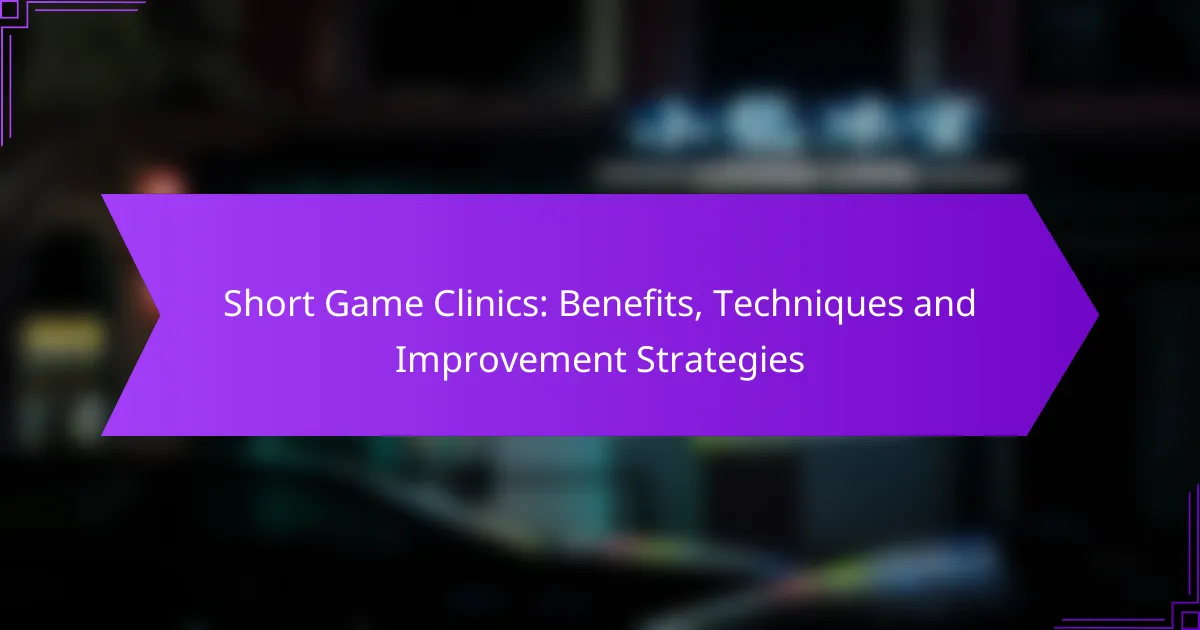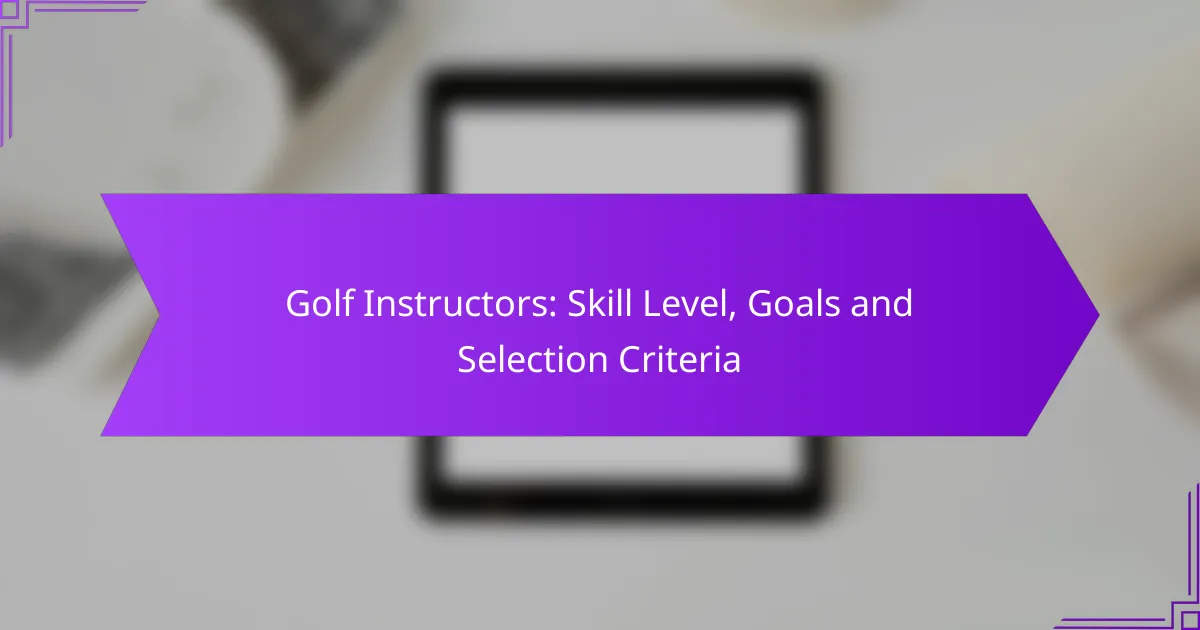Short game clinics are an excellent opportunity for golfers to refine their skills in chipping, pitching, and putting. By participating, golfers gain targeted instruction and practical drills that enhance their accuracy and control around the greens, ultimately leading to improved performance and greater confidence in their game.

What are the benefits of short game clinics?
Short game clinics offer numerous advantages for golfers looking to enhance their skills around the greens. Participants can expect to improve their chipping, pitching, and putting abilities, while also gaining valuable insights from experienced instructors.
Improved chipping and pitching skills
Short game clinics focus heavily on chipping and pitching techniques, which are crucial for lowering scores. Through targeted drills, golfers learn to control distance and trajectory, making it easier to get up and down from around the greens.
Practicing various lies and conditions helps players develop a versatile short game. For instance, learning to execute flop shots or delicate chips can significantly improve a player’s ability to navigate challenging course layouts.
Enhanced putting techniques
Putting is often the most critical aspect of a golfer’s game, and clinics provide specialized training to refine this skill. Participants learn about proper stance, grip, and alignment, which are essential for consistent putting performance.
Instructors often introduce drills that focus on distance control and reading greens, helping golfers make more confident and accurate putts. Regular practice of these techniques can lead to noticeable improvements in overall putting statistics.
Increased confidence on the course
As golfers improve their short game skills, their confidence on the course naturally increases. Knowing that they can handle tricky chips and putts allows players to approach each hole with a positive mindset.
This newfound confidence can lead to better decision-making during play, reducing anxiety and enhancing overall enjoyment of the game. Players often find that their scores improve as they become more self-assured in their abilities.
Personalized feedback from instructors
One of the key benefits of short game clinics is the opportunity for personalized feedback from experienced instructors. This tailored guidance helps players identify specific areas for improvement and develop effective strategies to address them.
Instructors can provide immediate corrections during practice, allowing golfers to make adjustments in real-time. This hands-on approach accelerates learning and fosters a deeper understanding of short game techniques.
Networking opportunities with other players
Short game clinics also serve as excellent networking opportunities for golfers. Participants can connect with fellow players who share similar goals and interests, fostering a sense of community.
Building relationships with other golfers can lead to practice partners, friendly competitions, and shared learning experiences. These connections often enhance the overall enjoyment of the sport and encourage continued improvement.
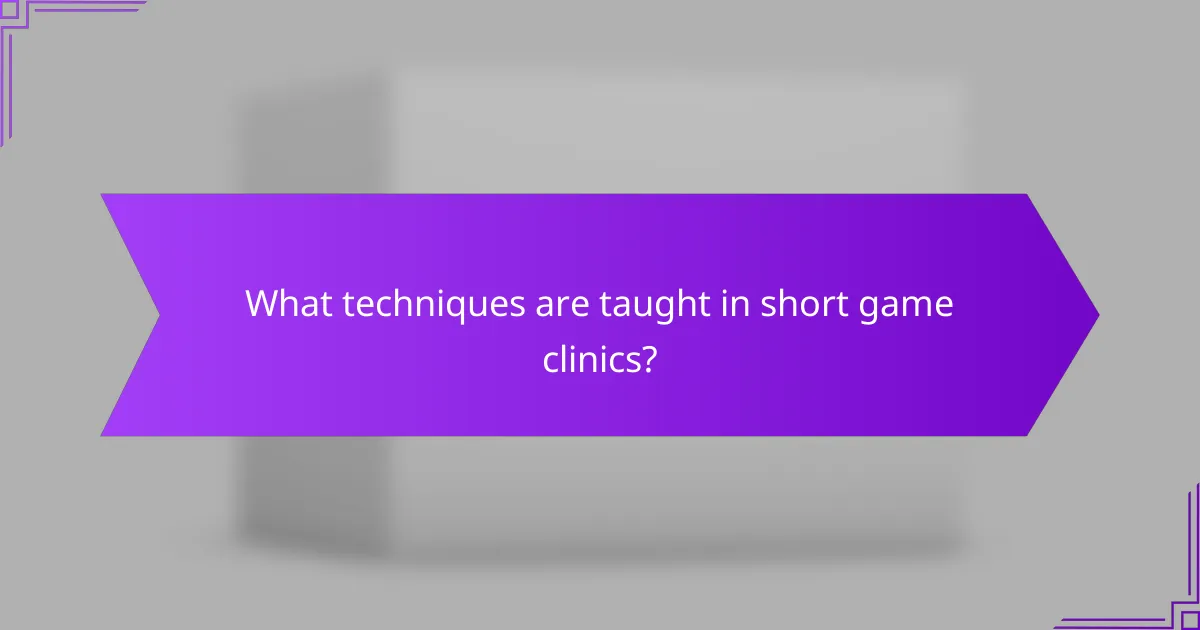
What techniques are taught in short game clinics?
Short game clinics focus on essential techniques that enhance players’ skills around the greens, such as chipping, putting, and pitching. These clinics provide practical instruction and drills to improve accuracy, control, and overall performance in the short game.
Chipping fundamentals
Chipping is a critical skill that involves hitting the ball from just off the green to get it close to the hole. Key fundamentals include proper stance, grip, and swing mechanics. Players should maintain a stable lower body and use a pendulum motion with their arms to ensure consistent contact.
To practice chipping effectively, focus on landing the ball on a specific target area on the green. This can be achieved by visualizing where you want the ball to land and adjusting your swing accordingly. Common pitfalls include using too much wrist action or failing to follow through.
Putting drills and strategies
Putting is often considered the most crucial part of the game, and effective drills can significantly enhance a player’s accuracy and confidence on the greens. Key strategies include developing a consistent routine, focusing on alignment, and maintaining a smooth stroke. Players should practice both short and long putts to build versatility.
One effective drill is the “gate drill,” where players place two tees slightly wider than their putter head to ensure a straight stroke. Additionally, practicing distance control with various lengths of putts can help players gauge their touch on the greens, reducing three-putts.
Pitching techniques for various lies
Pitching involves hitting the ball from a distance of around 30 to 100 yards, often requiring different techniques based on the lie of the ball. Key considerations include the type of grass, slope, and the amount of green to work with. Players should adjust their stance and club selection accordingly.
For a tight lie, use a more descending blow with a shorter club, while for a fluffy lie, a more sweeping motion with a higher lofted club can be beneficial. Practicing various lies will help players become more adaptable and confident in their pitching abilities.
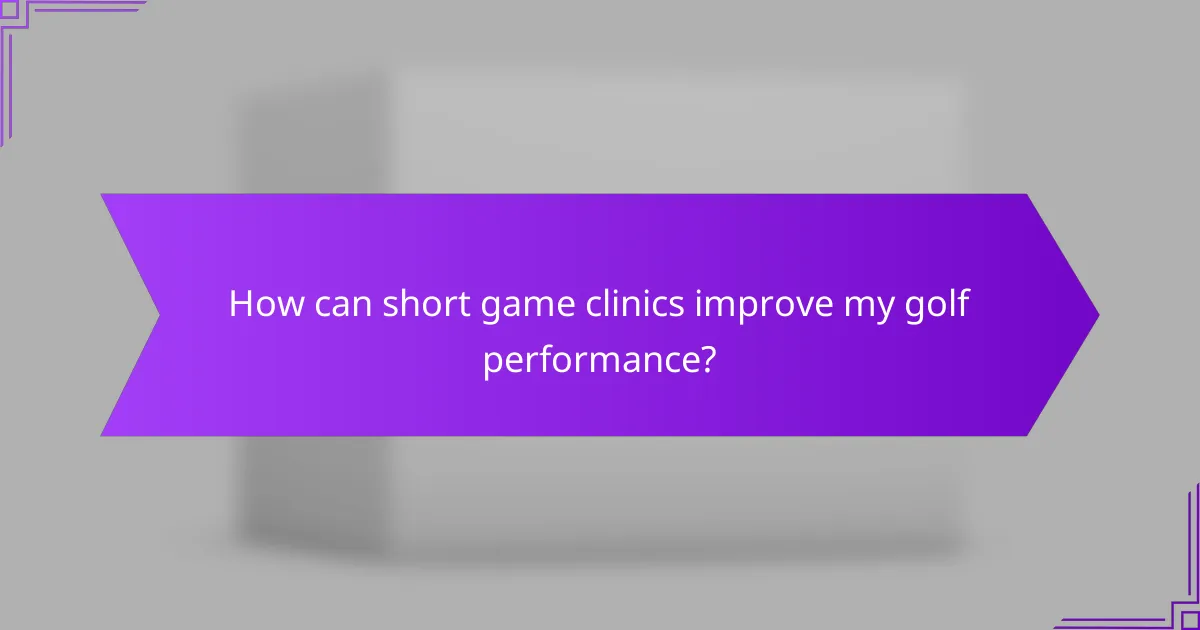
How can short game clinics improve my golf performance?
Short game clinics can significantly enhance your golf performance by focusing on the skills needed for effective chipping, pitching, and putting. These clinics provide targeted instruction and practice opportunities that lead to better technique and increased confidence around the greens.
Lowering overall scores
Improving your short game is one of the most effective ways to lower your overall golf scores. By mastering shots from within 100 yards, you can reduce the number of strokes taken on each hole. Players often find that even a few improved shots can lead to significant score reductions, often in the range of 3-5 strokes per round.
Participating in clinics allows you to learn specific techniques that can be immediately applied during play. This hands-on experience helps solidify skills, making it easier to execute under pressure during actual rounds.
Reducing strokes around the green
Short game clinics focus on reducing strokes around the green by teaching effective chipping and putting techniques. Many golfers struggle with these shots, which can lead to unnecessary strokes added to their score. By practicing these skills, players can often save 1-3 strokes per round by improving their ability to get up and down from around the greens.
Techniques such as proper stance, grip, and swing mechanics are emphasized in clinics, allowing golfers to make more consistent contact with the ball. Regular practice of these skills can lead to a noticeable improvement in performance.
Enhancing course management skills
Course management is crucial for lowering scores, and short game clinics can enhance these skills by teaching players how to make strategic decisions based on their short game capabilities. Understanding when to play aggressively or conservatively around the greens can lead to smarter shot selection and better outcomes.
Clinics often include discussions on reading greens, understanding break, and choosing the right club for various situations. By practicing these strategies, golfers can improve their decision-making, which is essential for effective course management.
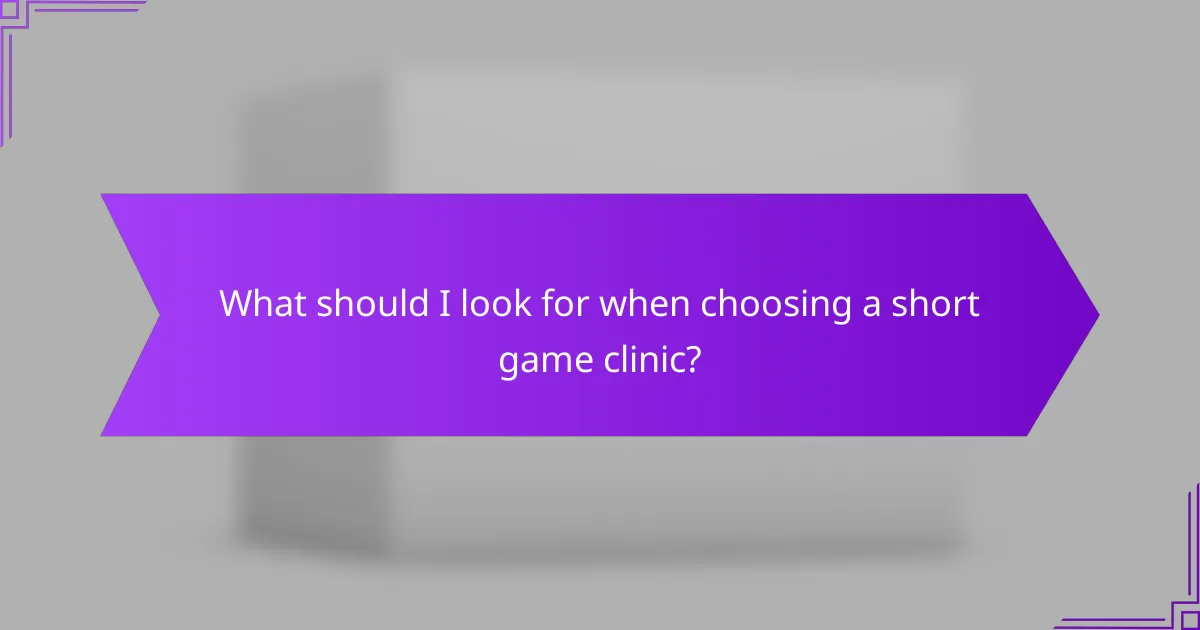
What should I look for when choosing a short game clinic?
When selecting a short game clinic, prioritize the instructor’s qualifications, the size of the clinic, and the quality of the facilities. These factors significantly impact the learning experience and your overall improvement in short game skills.
Instructor qualifications and experience
Look for instructors with relevant certifications and extensive experience in teaching short game techniques. Ideally, they should have a background in coaching at various levels, including amateur and professional players.
Instructors who have played competitively often bring valuable insights and practical tips that can enhance your learning. Check for testimonials or reviews from previous participants to gauge their effectiveness.
Clinic size and participant ratio
The size of the clinic and the participant-to-instructor ratio are crucial for personalized attention. Smaller clinics, typically with 5-10 participants per instructor, allow for more tailored feedback and interaction.
A lower ratio ensures that you receive ample guidance on your techniques, which is essential for mastering the short game. Avoid clinics with large groups, as they may limit individual instruction and practice time.
Location and facility quality
Choose a clinic located at a well-maintained facility with access to quality practice areas, such as chipping and putting greens. The environment should be conducive to learning, with adequate space for drills and exercises.
Consider the convenience of the location as well. A clinic that is easily accessible can enhance your overall experience and commitment to attending sessions regularly.
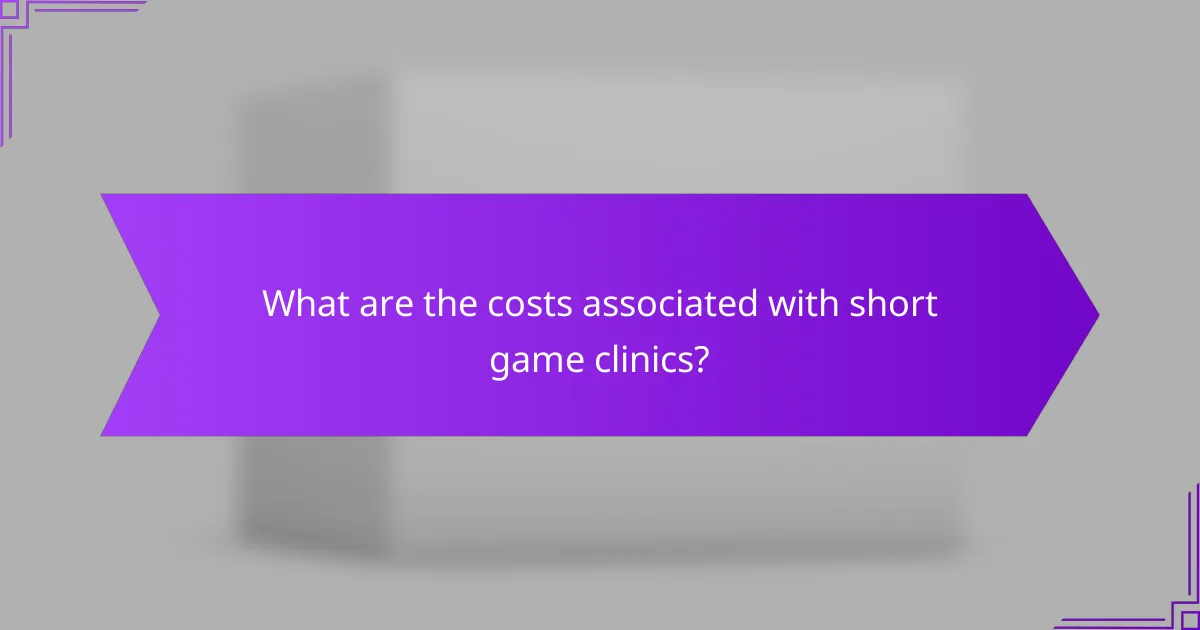
What are the costs associated with short game clinics?
The costs associated with short game clinics can vary significantly based on location, duration, and the expertise of the instructors. Typically, participants can expect to pay anywhere from a few hundred to over a thousand dollars for a comprehensive clinic experience.
Average pricing ranges
Short game clinics generally range from approximately $100 to $500 per session, depending on factors such as the length of the clinic and the reputation of the facility. Multi-day clinics or those with specialized instruction may cost upwards of $1,000.
For example, a half-day clinic focusing on chipping and putting might be priced around $150, while a full weekend workshop could be priced between $600 and $800. Always check for any additional fees that may apply.
Included amenities and services
Many short game clinics offer a variety of amenities and services that enhance the learning experience. Common inclusions are personalized instruction, access to practice facilities, and sometimes even video analysis to help improve technique.
Some clinics may also provide meals, equipment rental, or practice balls as part of the package. It’s advisable to inquire about what is included before booking to ensure you receive the best value for your investment.
